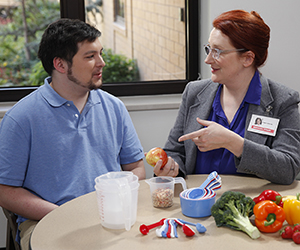Diabetes and Kidney Disease
Diabetes makes your body less able to use the foods you eat as sources of energy. As a result, sugar that the body uses as fuel (glucose) builds up in the blood. Over time, having too much glucose in your blood can harm blood vessels and kidneys. By controlling diabetes, you can stay at a healthy blood glucose level. And you can slow or prevent kidney damage.
African Americans, Native American, and Hispanics and Latinos have diabetes, chronic kidney disease, and kidney failure at rates higher than whites. People with diabetes should have their kidney function measured at least once a year with blood and urine tests. Having diabetes is the most common reason for needing dialysis or a kidney transplant.
Note
Visit your healthcare provider as scheduled.
Follow your diet
To get the most energy from the foods you eat and feel your best, you may have to follow a special diet. Work closely with your healthcare team. They can help you make a meal plan that's right for you.
You may also need to:
-
Eat less protein.
-
Drink less fluid.
-
Limit salt (sodium) intake.
-
Eat foods that are low in phosphorus and potassium.
-
Don't take or lower the amount of certain medicines that affect or are processed by the kidneys.

Take insulin and diabetes medicine as directed
Insulin is a hormone that helps your body use glucose. You may give yourself insulin to increase your body’s supply. Or you may take other medicines to help your body release more insulin or use insulin better. The stage of your kidney disease can reduce the amount of insulin your body needs. So your insulin injections or other medicine may be adjusted. Talk with your provider if your blood glucose level is often too low. Closely watch your blood glucose with a meter as directed by your provider.
Threetypes of blood pressure medicines help people with both diabetes and high blood pressure reduce their risk of getting kidney disease. And reduce the risk of worsening existing kidney disease. These medicines are:
-
Angiotensin-converting enzyme (ACE) inhibitors
-
Angiotensin receptor blockers (ARBs)
-
Sodium-glucose co-transporter 2 (SGLT2) inhibitors
Studies show these medicines work even in people with diabetes who don't have high blood pressure.
Your provider will monitor how much protein your kidneys release into the urine as a sign of how diabetes is affecting your kidneys. One or two times a year, you'll also need a blood test to see how your kidneys are processing other substances.
Controlling these other risk factors for kidney disease and diabetes will also help slow kidney disease progression:
-
Quitting smoking as soon as possible, if you smoke
-
Controlling high blood pressure
-
Limiting alcohol
-
Staying at a healthy body weight
-
Getting regular physical activity
Stay active
Exercise helps the body use glucose. For best results:
-
Talk with your provider before starting a fitness program.
-
Ask your provider what activities you should do, how often you should exercise, and for how long.
-
Eat 1 to 2 hours before you exercise. Check your blood sugar right before you exercise to see if it's safe to exercise at that time.
-
Keep a pack of diabetes supplies and snacks close at hand. These snacks can help prevent low blood sugar (hypoglycemia).
-
Always wear a medic alert necklace, bracelet, or information tag, which states that you have diabetes and/or other health concerns.